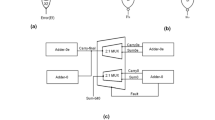Abstract
In this paper the detection of hardware faults by pseudoduplication for a special floating point adder is investigated. For a special floating point adder all single stuck-at-0/1 faults are injected. In a first simulation experiment for random input patterns all the faults are determined which can be detected by pseudoduplication. In a second experiment for sequences of random input vectors with different lenght the probability to detect an arbitrary single fault is determined.
Preview
Unable to display preview. Download preview PDF.
Similar content being viewed by others
References
Assaad, F.T., Dutt, S.: “More Robust Test in Algorithm-Based Fault-TolerantMatrix Multiplication”, Proc. FTCS-22, pp430–439, 1992
Cavanagh, J.: “Digital Computer Arithmetic”, Mc Graw-Hill, 1984
Echtle, K., Hinz, B., Nikolov, T.: “On hardware fault detection by diverse software”, Fault Tolerant Systems & Diagnostics (FTSD-13), Varna, 1990, pp 362–367
Goldberg, D.: “What every computer scientist should know about floating-point arithmetic”, ACM Computing Surveys, Vol. 23, No.1, March 1991, pp5–45
Hahn,W.and Gössel,M.:“Pseudoduplication of Floating Point Faults”, Proc. 1991 IEEE VLSI Test Symposium, Atlantic City,April 15–17, ppl61–165.
IEEE Standard for Binary Floating-Point Arithmetic ANSI/IEEE Std 754-1985, New York, August 1985
Laha, S., Patel, J., H.: “Error Correction in Arithmetic Operations. Using Time Redundancy”, 13th Int. Symp. Fault Tolerant Comp., Milano, 1984, ppl98–205
Minero, R. H., Anello, A. J., Furey, R. G., Palounek, L. R.: “Checking by pseudoduplication”, US PS 3660646, GO6F 11/00,1972
Patel, J. H., Fung, L. Y.: “Concurrent Error Detection in Multiply and Divide Arrays”, IEEE Trans. Comp. C-32 (1983), pp417–422
Sparmann,U.:“Strukturbasierte Testmethode fuer arithm. Schaltkreise”, Dissertation,Saarbruecken, 1991
Wei, D.D, Kim, J. H., Rao, T. R. N.: “CompleteTests in Algorithm-Based Fault-Tolerant Matrix Operationson Processor Arrays”, Proc. IEEE Int. Workshop Defect and Fault Tolerance in VLSI Systems, pp255–262, Venice 1993.
Author information
Authors and Affiliations
Editor information
Rights and permissions
Copyright information
© 1994 Springer-Verlag Berlin Heidelberg
About this paper
Cite this paper
Gerber, S., Goessel, M. (1994). Detection of permanent hardware faults of a floating point adder by pseudoduplication. In: Echtle, K., Hammer, D., Powell, D. (eds) Dependable Computing — EDCC-1. EDCC 1994. Lecture Notes in Computer Science, vol 852. Springer, Berlin, Heidelberg. https://doi.org/10.1007/3-540-58426-9_139
Download citation
DOI: https://doi.org/10.1007/3-540-58426-9_139
Published:
Publisher Name: Springer, Berlin, Heidelberg
Print ISBN: 978-3-540-58426-1
Online ISBN: 978-3-540-48785-2
eBook Packages: Springer Book Archive




